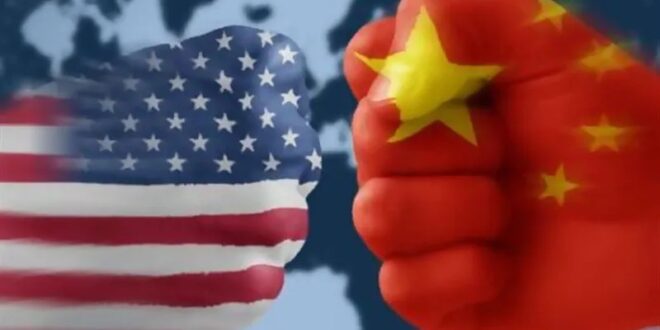Joshua Keating, a foreign policy analyst, staff writer, and author of the World blog at Slate, and a former writer and editor at Foreign Policy magazine in an article updated on January 2022 wrote that “war over Taiwan would likely involve the largest and most complex amphibious invasion ever mounted. Were the conflict to drag on, it might well evolve into a building-to-building, mountaintop-to-mountaintop ground war in one of the most densely populated and economically advanced countries on Earth. And that’s just in Taiwan itself”.
Such a venture is unlikely at the moment given the overwhelming desire of the world for peace and the cost involved in the venture for China.
Despite “no limits” Sino-Russian entente against the US hegemonic policy which has ruled the world since the end of the Second World War, albeit to the advantage of the Western bloc, e.g. US supremacy in the World Bank and European supremacy in European Banks the world has been content with this rule-based arrangement till the British ruled the waves. With the disappearance of British-ruled India and African nations, another strand of policy e.g. non-alignment rose to its head led by Pandit Nehru of India, Kwame Nkrumah of Ghana, Sukarno in Indonesia, Joseph Broz Tito of Yugoslavia and Gamal Abdul Nasser of United Arab Republic.
The Non-Aligned Movement (NAM) is a forum of 120 countries that are not formally aligned with or against any major power bloc. After the United Nations, it is the largest grouping of states worldwide the movement originated in the aftermath of the Korean War, as an effort by some countries to counterbalance the rapid bi-polarization of the world during the Cold War, whereby two major powers formed blocs and embarked on a policy to pull the rest of the world into their orbits. Indonesian President Sukarno held the first Conference of Heads of State or Government of non-aligned countries.
The purpose of the organization is to ensure “the national independence, sovereignty, territorial integrity and security of non-aligned countries” in their “struggle against imperialism, colonialism, neo-colonialism racism, and all forms of foreign aggression, occupation, domination, interference or hegemony as well as against great powers politics.”
The countries of the Non-Aligned Movement represent nearly two-thirds of the United Nations’ members and contain 55% of the world population. Membership is particularly concentrated in countries considered to be developing or part of the Third World, although the Non-Aligned Movement also has a number of developed nations.
China’s Desire To Take Back Taiwan
Joshua Keating adds, “China’s desire to retake Taiwan goes back decades. While still far from inevitable, this nightmare scenario has never seemed more likely. Beijing has sought control of Taiwan, which it considers a wayward province, ever since 1949, when fleeing Chinese nationalist forces set up a government on the island. China unsuccessfully attempted military force against Taiwan in the 1950s and 1990s. For much of that period, Taiwan itself had a superior military to the People’s Republic, and U.S. naval dominance in the region was unquestioned. But in recent years, the balance of power has shifted dramatically, thanks to China’s economic rise and one of the largest and fastest military buildups in history. Until a few years ago, most experts believed China had little chance of successfully taking Taiwan in the face of U.S. opposition. Now, as another analyst has put it, the U.S. regularly “gets its ass handed to it” in Pentagon war games simulating a Chinese invasion of Taiwan. Lately, Chinese leaders have shown signs that they are running out of patience.
On more than one occasion, Chinese President Xi Jinping said that the Taiwan issue should not be “passed on from generation to generation.” More recently, he emphasized: “The historical task of the complete reunification of the motherland must be fulfilled and will definitely be fulfilled.” The outgoing U.S. Indo-Pacific commander, Adm. Phil Davidson, suggested in congressional testimony in March 2021 that China is likely to move on Taiwan “in the next six years.” Besides a Chinese landing on Taiwan would “be the most complex operation in modern military history,” said Michael Beckley, a professor at Tufts University and fellow at the American Enterprise Institute who studies U.S.-China competition.
Despite Xi-Jinping’s bravado, it is up in the air what his intention is likely to be. Biden administration has not made clear its intention of the mode of support to Taiwan. Taiwan has been one of the invitees to Joe Biden’s Democracy Summit which has enraged Beijing. Adding insult to injury had been visits to Taiwan by past and present Presidents of US Congress.
Harvard Luminary Stephen Walt in an article argued that NATO must be sustained because of four major areas in which close cooperation is beneficial to European and American interests. Defeating international terrorism; Stephen Walt saw a need for cooperation between Europe and the United States in managing terrorist networks and stopping the flow of money to terror cells. Limiting the spread of weapons of mass destruction; Walt argued that anti-proliferation efforts are most successful when Europe and the U.S. work in concert to bring loose nuclear material into responsible custody. Managing the world economy; lowering barriers to trade and investment particularly between the U.S. and the E.U. would accelerate economic growth. Notable differences in trade policy stem mainly in areas of agricultural policy. Dealing with failed states; failed states are breeding grounds for anti-Western movements.
Managing failed states such as Afghanistan, Bosnia, and Somalia require a multinational response since the U.S. has insufficient wealth to modernize and rebuild these alone. In this area, European allies are especially desirable because they have more experience with peacekeeping and “nation-building”. In 2015, Walt wrote that extending invitations for NATO membership to countries in the former Soviet bloc is a “dangerous and unnecessary goal” and that nations such as Ukraine ought to be “neutral buffer state(s) in perpetuity.” From that perspective, he believed that arming Ukrainian armed forces after the annexation of the Crimea by Russia “is a recipe for a longer and more destructive conflict.”
On the other hand, Alexander Gabuev (Director of the Carnegie Russia Eurasia Center) has taken serious note of the recent utterings of XI-Jinping when he wrote in April 2023 that, “There are changes happening, the likes of which we haven’t seen for 100 years,” Chinese leader Xi Jinping said to Russian President Vladimir Putin last month at the end of a state visit to Russia. “Let’s drive those changes together.” To this, the Russian leader responded, “I agree.”
This seemingly improvised yet carefully choreographed scene captured the outcome of Xi’s trip to Russia and the trajectory on which he and Putin have set Sino-Russian relations. Xi’s visit last month was first and foremost a demonstration of public support for the embattled Russian leader. But the truly significant developments took place during closed-door, in-person discussions, at which Xi and Putin made a number of important decisions about the future of Chinese-Russian defense cooperation and likely came to terms on arms deals that they may or may not make public.
The war in Ukraine and ensuing Western sanctions on Russia are reducing the Kremlin’s options and pushing Russia’s economic and technological dependence on China to unprecedented levels. These changes give China a growing amount of leverage over Russia. At the same time, China’s fraying relationship with the United States makes Moscow an indispensable junior partner to Beijing in pushing back against the United States and its allies. China has no other friend that brings as much to the table. And as Xi prepares China for a period of prolonged confrontation with the most powerful country on the planet, he needs all the help he can get.”
Whether these utterings of Xi-Jinping are a preparation for war on Taiwan only time can tell. Given the global demand for a peaceful resolution of the Ukraine conflict Russia saving its face and keeping its local base of supporters in check would be the best solution for both Taiwan and Ukraine’s problems. Foreign Policy editor James Palmer is not optimistic about US-China relations in particular due to the cancellation of Anthony Blinken’s visit to China. In his words, “The United States has expressed a desire to establish so-called guardrails around the relationship to prevent mutual bitterness from spiraling into worse conflict. Yet no one in Beijing is picking up the U.S. outreach; in fact, there is active hostility toward establishing such restraints, which Beijing sees as another way for Washington to contain Chinese power. There are Chinese officials who would like to ensure an event such as a sea collision, a U.S. official visit to Taiwan, or a spy balloon doesn’t escalate into an armed clash, but they are an increasingly disempowered minority. In addition to the meeting with Burns, Qin has been busy so far this month. China and Pakistan are cooperating on an attempt to reintegrate a Taliban-led Afghanistan back into the international order; at a recent meeting, Qin promised an extension of Belt and Road funding to the country”.
James Palmer Editor of Foreign Policy magazine is not optimistic of the future of US-China relations. In his own words, “The United States has expressed a desire to establish so-called guardrails around the relationship to prevent mutual bitterness from spiraling into worse conflict. Yet no one in Beijing is picking up the U.S. outreach; in fact, there is active hostility toward establishing such restraints, which Beijing sees as another way for Washington to contain Chinese power.”
Chinese Foreign Minister Qin Gang has been busy emphasizing China and Pakistan’s cooperation to reintegrate a Taliban-led Afghanistan back into the international order. In a recent meeting, Qin promised an extension of Belt and Road funding to the country”. Given the fact that Xi Jinping has complete control of all facets of Chinese life and has packed the central committee of the Communist Party with loyalists regardless of their political acumen, US-China relations would depend on the wishes of Xi-Jinping and his coterie. But then the days of the suzerainty of the West or the Sino-Russian friendship “without limit” are gone. Both the West and China have to take into consideration the rest of the world who do not want an unsettled future. Both Xi- Jinping and the possible combatants have time to ponder their moves.
 Eurasia Press & News
Eurasia Press & News




